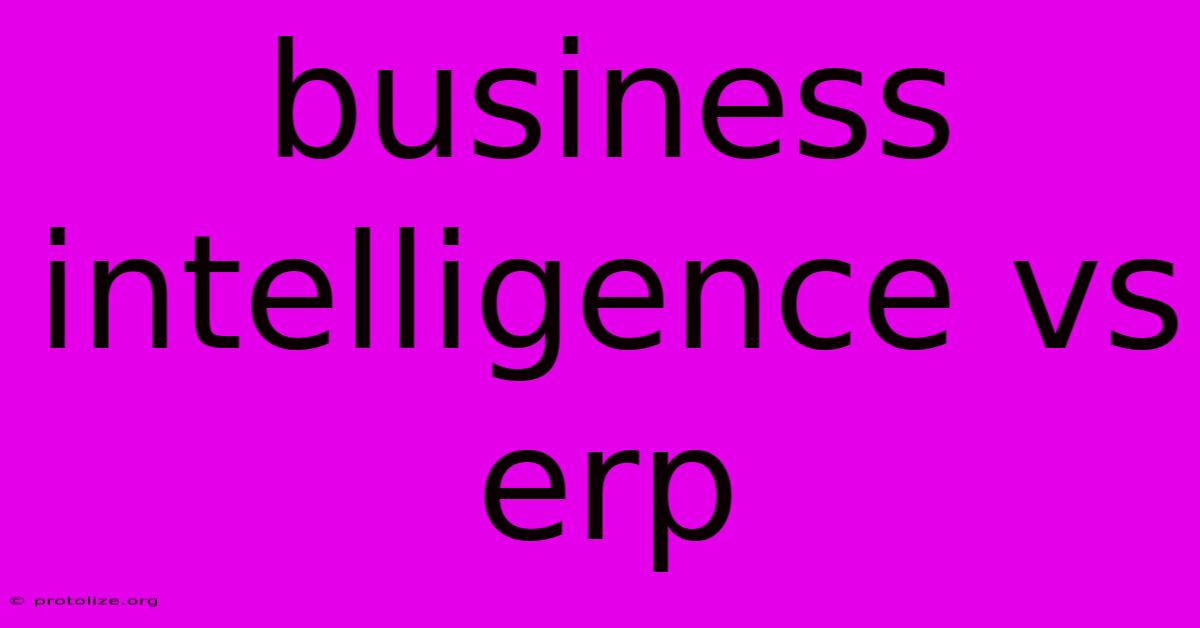Business Intelligence Vs Erp

Discover more detailed and exciting information on our website. Click the link below to start your adventure: Visit Best Website mr.cleine.com. Don't miss out!
Table of Contents
Business Intelligence vs. ERP: Understanding the Key Differences
Choosing the right software solutions for your business can be a daunting task. Two systems often mentioned in the same breath, but with vastly different functionalities, are Business Intelligence (BI) and Enterprise Resource Planning (ERP). While they can work together seamlessly, understanding their core differences is crucial for making informed decisions. This article will clarify the distinctions between BI and ERP, helping you determine which—or both—are right for your organization.
What is Business Intelligence (BI)?
Business Intelligence is a technology-driven process that focuses on gathering, analyzing, and interpreting data to drive better business decisions. BI tools use data from various sources to provide actionable insights into key performance indicators (KPIs), market trends, customer behavior, and operational efficiency. Think of it as your company's strategic "eyes" and "brain".
Key Features of BI:
- Data Visualization: BI software excels at presenting complex data in easy-to-understand charts, graphs, and dashboards. This allows for quick identification of trends and patterns.
- Reporting and Analytics: Generate custom reports and conduct in-depth analyses to uncover valuable insights.
- Predictive Analytics: Many BI tools offer predictive capabilities, allowing businesses to forecast future trends and proactively adapt their strategies.
- Data Mining: BI software can delve deep into large datasets to uncover hidden relationships and correlations.
- Data Integration: BI systems can connect to and integrate data from various sources, including CRM, ERP, and marketing automation platforms.
What is Enterprise Resource Planning (ERP)?
Enterprise Resource Planning (ERP) is an integrated software system that manages and automates many business processes, including planning, purchasing inventory, sales, marketing, finance, human resources, and more. It acts as a central nervous system, coordinating all essential functions within an organization.
Core Functions of ERP:
- Inventory Management: Track inventory levels, manage orders, and optimize supply chains.
- Supply Chain Management: Streamline procurement, logistics, and distribution processes.
- Financial Management: Manage accounting, budgeting, and financial reporting.
- Human Resources Management: Manage employee information, payroll, and benefits.
- Customer Relationship Management (CRM) Integration: Many ERP systems integrate with CRM solutions to provide a holistic view of customer interactions.
BI vs. ERP: A Detailed Comparison
| Feature | Business Intelligence (BI) | Enterprise Resource Planning (ERP) |
|---|---|---|
| Primary Focus | Analyzing data for strategic decision-making | Automating and integrating business processes |
| Data Source | Diverse sources (internal and external) | Primarily internal operational data |
| Functionality | Data visualization, reporting, analytics, predictive modeling | Inventory, finance, HR, supply chain, and more |
| Goal | Improve decision-making, identify trends, optimize performance | Increase efficiency, improve collaboration, reduce costs |
| Users | Primarily management, analysts, and decision-makers | Across different departments and roles within the organization |
The Synergistic Relationship Between BI and ERP
While distinct, BI and ERP systems are often complementary. ERP systems provide the data, while BI systems analyze that data to extract meaningful insights. Integrating these two systems can provide a powerful combination, enabling businesses to:
- Improve operational efficiency: Analyze ERP data to identify bottlenecks and areas for improvement.
- Enhance decision-making: Gain a clear picture of key performance indicators and make data-driven decisions.
- Optimize supply chain management: Analyze supply chain data to identify areas for cost reduction and improved efficiency.
- Improve customer satisfaction: Use customer data from ERP to understand customer behavior and tailor offerings accordingly.
Choosing the Right System for Your Business
The choice between BI and ERP depends heavily on your specific business needs and goals. Smaller businesses might start with an ERP system to streamline operations, later integrating BI for advanced analysis. Larger enterprises might require both systems from the outset to manage complex data and processes. A thorough assessment of your current processes, data needs, and future goals is essential for making the right decision. Consider consulting with technology experts to determine the best approach for your organization. Investing wisely in the right software can significantly impact your business's success.

Thank you for visiting our website wich cover about Business Intelligence Vs Erp. We hope the information provided has been useful to you. Feel free to contact us if you have any questions or need further assistance. See you next time and dont miss to bookmark.
Featured Posts
-
Open Source Erp
Dec 13, 2024
-
James Kennedy Vpr Arrested Domestic Violence Allegations
Dec 13, 2024
-
Man United 2 1 Hojlund Scores Twice
Dec 13, 2024
-
Apple I Os 18 2 Released
Dec 13, 2024
-
Goa Five Russian Women Rescued From Sea
Dec 13, 2024
